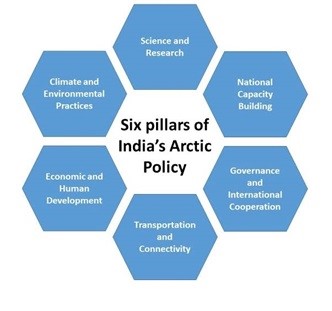Context
In December 2023, four Indian climate scientists embarked on a groundbreaking journey to the Arctic, marking India's inaugural winter expedition to the region. Set against the backdrop of Himadri, India's research station nestled within the International Arctic Research Base at Svalbard in Norway, this endeavor symbolized India's evolving interest and commitment to Arctic exploration. While Himadri had previously hosted missions only during the summer, the winter expedition posed new challenges, including living in extreme cold and enduring polar nights. This bold venture signified a paradigm shift in India's Arctic policy, driven by emerging scientific data revealing accelerated warming in the region and its potential ramifications on global climate patterns, particularly affecting India.
India's Arctic Engagement: A Historical Perspective
India's engagement with the Arctic dates back to 1920 with the signing of the Svalbard Treaty in Paris, marking the country's early recognition of the region's significance. However, it wasn't until 2007 that India undertook its first research mission to the Arctic, focusing on microbiology, atmospheric sciences, and geology. Establishing itself as a prominent player, India became the only developing country alongside China to establish an Arctic research base in 2008. Subsequent milestones included obtaining 'observer' status from the Arctic Council in 2013 and commissioning key scientific installations in Svalbard, emphasizing India's commitment to studying Arctic ice systems and glaciers and their impact on the Indian monsoon and Himalayan region.
Drivers of India's Arctic Imperative
India's Arctic policy transformation can be attributed to three primary drivers. Firstly, the revelation of accelerated Arctic warming propelled India to reevaluate its engagement, recognizing the interconnectedness of global climate systems and the need for proactive measures. Secondly, the emergence of Arctic Sea routes, particularly the Northern Sea Route, as potential trade corridors sparked India's interest in leveraging these routes to enhance trade efficiency and reduce shipping costs. However, concerns over China's increasing presence in the Arctic, coupled with Russia's strategic decisions regarding access to Arctic routes, added a geopolitical dimension to India's Arctic imperative. Against the backdrop of heightened regional tensions exacerbated by the Russia-Ukraine conflict, India sought to navigate a delicate balance between fostering constructive relations with Arctic stakeholders and safeguarding its strategic interests.
Divergent Perspectives: Debating India's Arctic Role
India's Arctic engagement has sparked debates within its academic and policy circles, reflecting divergent viewpoints on the implications of Arctic warming for India's economy. Proponents advocate for pragmatic economic exploitation of Arctic resources, particularly fossil fuels, emphasizing the potential for economic growth and energy security. In contrast, skeptics caution against the environmental consequences of resource extraction, underscoring the need for a balanced policy framework that prioritizes environmental preservation alongside economic interests. This debate underscores the complexity of India's Arctic policy landscape, highlighting the imperative for informed decision-making guided by scientific evidence and long-term sustainability goals.
Prospects for Collaboration: The Role of Norway
Norway, as the current chair of the Arctic Council, holds a pivotal position in shaping India's Arctic engagement strategy. Building on decades of collaboration, Norway and India have forged close ties in investigating Arctic and Antarctic conditions and their impact on South Asia. India's emphasis on green energy and sustainable industries aligns with Norway's priorities, laying the foundation for enhanced collaboration in areas such as waste management, renewable energy, and environmental protection. A strategic partnership with Norway could offer India greater participation in Arctic Council working groups, facilitating dialogue on critical issues such as maritime transportation, investment, and responsible resource development. Moreover, Norway's expertise in sustainable resource management could aid India in designing a holistic Arctic policy framework that balances scientific research with economic interests while prioritizing environmental conservation.
Toward a Sustainable Arctic Future
As India charts its course in the Arctic, the imperative for sustainable development remains paramount. While economic opportunities abound in Arctic resource exploitation, India must uphold principles of environmental stewardship and responsible governance. Collaborative efforts with Arctic stakeholders, particularly Norway, offer avenues for scientific research, climate protection, and sustainable resource management. By embracing a holistic approach encompassing economic, environmental, and geopolitical dimensions, India can navigate the complexities of Arctic engagement while contributing to global efforts for a sustainable Arctic future.
Conclusion
India's foray into the Arctic reflects a multifaceted imperative driven by scientific, economic, and geopolitical considerations. As climate change accelerates in the region, India's proactive engagement underscores the interconnectedness of global climate systems and the need for collective action. While debates surrounding Arctic resource exploitation persist, collaboration with Arctic stakeholders, particularly Norway, holds promise for advancing India's Arctic agenda. By prioritizing sustainability and responsible governance, India can harness the potential of the Arctic while safeguarding its environmental and strategic interests. As India embarks on its Arctic journey, it must tread carefully, guided by principles of scientific inquiry, environmental preservation, and global cooperation, towards a more sustainable and equitable Arctic future.
|
Probable Questions for UPSC Mains Exam 1. Discuss the drivers behind India's evolving Arctic policy and analyze the implications of its engagement in the region, considering scientific, economic, and geopolitical factors. (10 marks, 150 words) 2. Evaluate the potential benefits and challenges of India's collaboration with Norway in the Arctic, particularly in the context of sustainable resource management and environmental conservation. (15 marks, 250 words) |
Source – The Hindu







